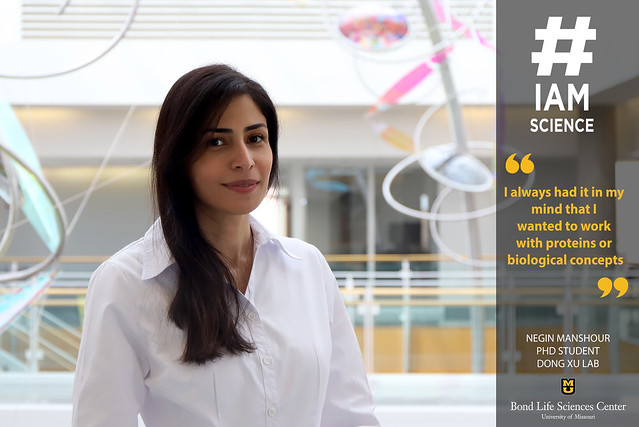Published on
Negin Manshour first stepped into biology research as an engineering student using robotic algorithms to simulate proteins. When she left academia for her nine-year career developing elevator systems, her fascination with biology never faded.
“I always had it in my mind that I wanted to work with proteins or biological concepts,” Manshour said.
Manshour, a second year Ph.D. student in the Dong Xu lab at Bond LSC investigates formation and structures of certain molecules. She uses machine learning to design peptides, small chains of amino acids which combine into proteins – building blocks for cells – that can serve as messengers or mimic substances that regulate processes in the body. They are often used in drug therapies across the medical spectrum.
“I cannot say which [field] is more valuable, but this project is related directly to human lives. So maybe it’s more precious to me, more valuable to me,” Manshour said.
Manshour always had a knack for numbers.
“In my high school, I was always in the top ranks of students because of my grades in mathematics or physics. Because of that, some of my teachers guided me to go to engineering. In Iran, electrical engineering is one of the best majors in our country,” Manshour said.
Manshour went from electrical engineering to mechatronics, a field that mixes mechanics, electronics and computing. The collaborative nature of mechatronics drew Manshour to it for her master’s.
“If you just have a view to the mechanical engineering of biomedical science, and you just purely work on that, that’s valuable. But we need some scientist to connect the science together. In connection, we can create something new,” Manshour said.
Manshour stepped into biology research for the first time through a robotics project during her master’s studies where she used robotic algorithms to simulate protein structure and calculate how proteins’ workspace changes based on its inner backbone’s angles.
“This was the first time that I faced biological concepts, and it was very amazing to me,” Manshour said.
The only problem was Manshour knew very little about biology.
So, she taught herself the basics of protein chains and molecular binding through biochemistry textbooks. Seeing her hard work, some of her professors recommended she pursue a Ph.D. Instead, she seized the opportunity to work on research and development of elevator systems.
“I needed to see the results of my research,” Manshour said.
She applied her engineering skills in industry for nine years before she decided to return to academia. Although some argued that Manshour should stick with her career, she knew she needed to pursue her passion.
“That was a difficult decision for me to make because I had my own comfort zone. I had everything that I wanted, but I had to change my path and go to a new area”
She left her job and the safety of her home country and came to the United States to study computational biology at Mizzou, where she continues to tackle problems with skills she picked up in her past work.
“I think that challenge has prepared me to be more professional to solve projects that are completely new to me.”
Manshour retains her connection to her family and home country despite the amount of time she spends in the United States.
“My parents and my siblings are my best friends,” Manshour said. “My parents are from a previous generation, but they can talk with me in every problem that I have.”
Now entrenched in biology research every day, Manshour finds a renewed fascination with the natural specificity of biological systems.
“I figured out that everything I did before in my job to make something artificial, everything we have in nature … There is no need for programming, there is no need for designing, there is no need for anything. Everything works automatically, and it’s amazing to me,” Manshour said.
